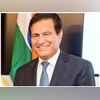China will never treat India as an equal partner and by amassing troops on the border, Beijing is forcing New Delhi to spend more money on defence than capital investment, Mukesh Aghi, the head of a top US-based India-centric business and strategic group has said.
The militaries of India and China have been locked in a standoff since May 2020 and a full resolution of the border row has not yet been achieved though the two sides have had several rounds of talks at the diplomatic and military levels.
What we are witnessing today is for the first time in a human race, a democratic nation of 1.4 billion people has shown exponential growth in the economic arena," Aghi, the president of the US-India Strategic and Partnership Forum (USISPF), said.
Growing at seven-eight per cent, India's economy is now touching USD 4 trillion.
"It is still very small when you compare it to the global GDP, which is around USD 105 trillion. We are still around 3 to 3.5 per cent of the global GDP, he told Indian-American entrepreneurs.
His remarks came as he participated in a panel discussion New Global India at the TiECon, the largest gathering of entrepreneurs and tech professionals organised by TiE Silicon Valley from May 1 to 3.
More From This Section
More important is what we are seeing is the challenges India faces as it tries to grow its economy. One of the biggest challenges it faces is China. China in every aspect will never treat India as an equal partner, he said.
China is a military power, an economic and a technology power. Basically, its objective is to dominate starting with the Asian Pacific. It sees India as a challenge," Aghi said.
That's where India has to find a balance to continue its economic trajectory for the next 20-plus years without having a war with this neighbour with which it shares a border of 3,000 kilometres, he said.
"Chinese do realise that. So, what they're doing is a thousand-cut strategy. They moved a hundred thousand troops on the border. India has to move another 100,000 thousand troops. So, it's eating into the capital defence budget, spending less on capital investment, and more on operation. That's the Chinese strategy," he said.
At the same time, Aghi said, the US sees India as a pivotal partner.
He said the US has more joint exercises with India than any other country in the world.
China also poses the greatest threat to the United States, he said.
The US for the first time after the Second World War is facing an adversary of this magnitude, which unlike its previous adversaries like Russia is both a military and economic power, Aghi said.
Participating in the panel discussion, Satyan Gajwani, Times Internet vice chairman, said that in the last five years, India has seen a political machinery that is responsive and proactive.
The amount of policy evolution that's happening around financial services in India is breathtaking to the point where you feel like the regulator is as current as the latest startup. Whereas here you watch Congressional hearings, and you see Congressmen asking CEOs how to fix their wifi, he said.
India is now sort of an idea which is fairly global in its reach rather than sort of a nation-state which is defined within the geographical boundaries of India, Motwani said.
J Sai Deepak, Supreme Court advocate, told the audience that Bharat cannot hope to forge its path ahead purely on economic lines without addressing certain civilisation issues. That I think is what will ultimately give it the currency to sit on the high table of big powers.
Because if you're internally weak, no matter how much you project strength outside, there is a fundamental hollowness to your strength or to your being, which will continue to plague you. It could also hand leverage to people who are interested in seeing India crush, Sai Deepak said.
(Only the headline and picture of this report may have been reworked by the Business Standard staff; the rest of the content is auto-generated from a syndicated feed.)

)
